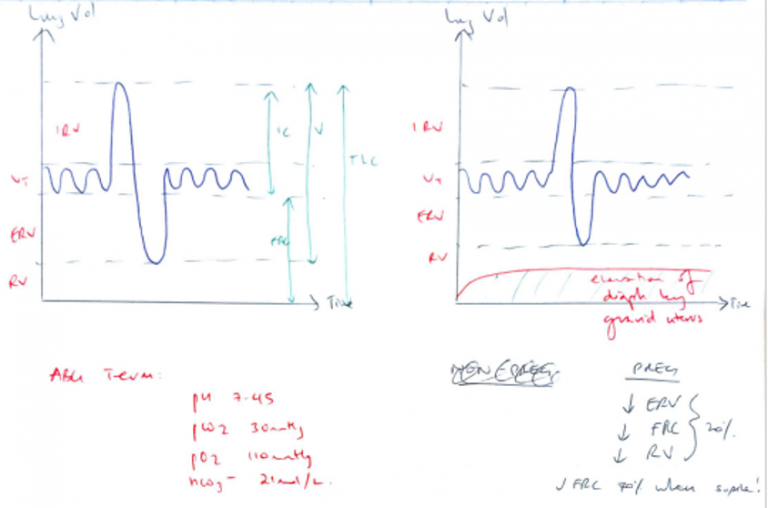22A18: Exam Report
Describe the respiratory changes that occur throughout pregnancy
31% of candidates passed this question.
The question asked for a description of the respiratory changes throughout pregnancy, which includes labour.
Simple lists of changes did not score highly.
A straightforward structure including; first, second and third trimester delineation would have elevated many answers from below par to a pass.
Many good answers gave succinct detail on both mechanical respiratory changes and the hormonal mechanisms behind them.
Higher scoring answers also described the overall effect of individual changes to spirometry, geometry or respiratory control.
14A04: Exam Report
Describe the respiratory changes during pregnancy
26% of candidates passed this question.
This question was variably answered, with a wide range of marks. Candidates often mentioned central regulation, anatomy, respiratory mechanics, static lung volumes or gas transfer, but did not provide comprehensive cover of all areas.
Very few clearly described the extent of any change (either as a percentage or actual amount relative to the non-pregnant state).
A number of candidates presented information well in diagrammatic form (e.g. static lung volumes) however then repeated this same information in text, which was unnecessary.
V1i / 20A18 / 14A04: Describe the respiratory changes in pregnancy
Anatomy
- Diaphragm displaced up 4cm (grand uterus)
- Vocal cord oedema 2° ↑ circulating vol.
Pulmonary Circulation
- ↑circulating blood vol → pulm. cap engorgement
Raw
- Dilated large airways
- ↓RAW 35%
Lung Volumes
↓ LUNG VOLUMES
↑ LUNG VOLUMES
- ERV 20%
- RV 20%
- FRC 20% (Supine 70% !)
- ↓expiratory capacity
- Inspiratory capacity
- Dead Space 40% 2° dilated airways
- ↑VT
- NO ∆ CC
MV/ABG
- ↑MV 50% at term
- ↑VT 40%
- ↑RR 10%
- ↑[ P ] x 6
- Stimulates resp centre
- ↑sensitivity to PCO2
- Shifts CO2 response curve L)
- ↓PCO2 26 – 32mmHg by 1st trimester

- ↓ PCO2
- ↑MV 2° progesterone & ↑pCO2 sensitivity facilitates diffusion out of placenta
- ↑ pO2
- Despite ↑O2 consumption
- ↑MV 2° P
- ↓PCO2 (Alv. Gas Equation)
- ↓ HCO3–
- Chronic resp alkalosis 2° ↓PCO2
- Compensated by ↑HCO3– excretion by kidneys
- pH
- Remains neutral / slight alkalosis
↓ Compliance
- No ∆ lung compliance
- ↓CW compliance
- 2° diaphragm displacement
- 2° weight of breasts
Labour
- ↑MV 2° pain
- ↑O2 consumption 2° uterine contractions
Post Delivery
- FRC normal in 48hrs
- TV normal in 5 days
- ↓sensitivity to CO2 rapidly